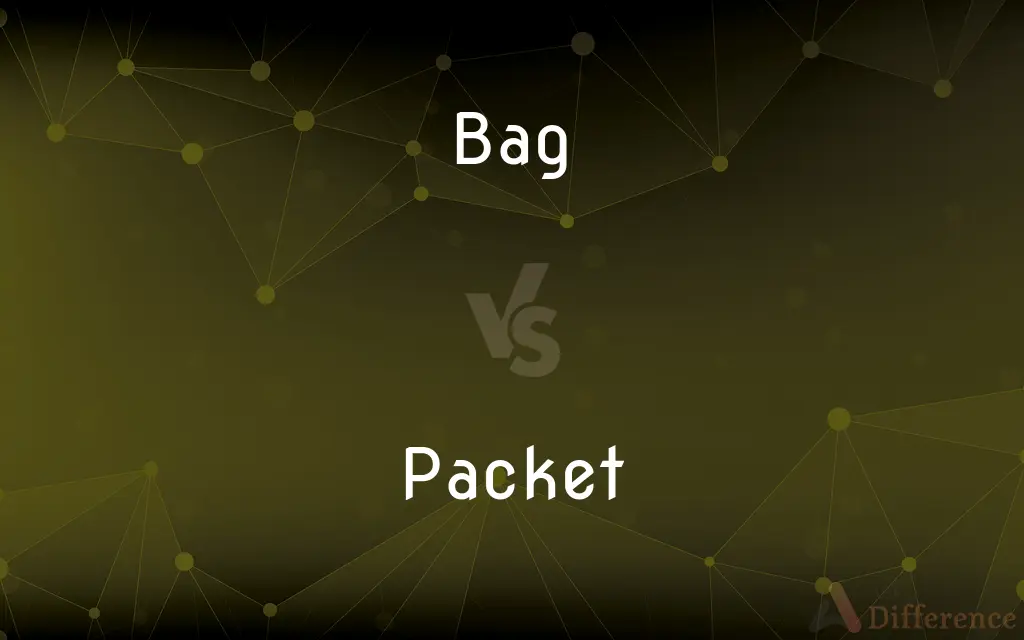Bag vs. Packet — What's the Difference?
By Urooj Arif & Maham Liaqat — Updated on March 17, 2024
A bag is a flexible container with an open top, used for carrying items, while a packet is a small or flat container, often sealed, used for enclosing something.

Difference Between Bag and Packet
Table of Contents
ADVERTISEMENT
Key Differences
Bags are typically larger and made from a variety of materials like paper, plastic, or fabric, designed to carry a wide range of items from groceries to personal belongings. On the other hand, packets are smaller, often used for enclosing a single item or a small quantity of material, such as ketchup or a tea bag.
While bags are reusable and can be used for a broad array of purposes, from shopping to storage, packets are generally single-use and designed to hold, protect, or preserve their contents until they are opened. Packets are often used for food items, condiments, and samples.
The design of a bag is focused on durability and capacity, allowing it to be carried over a shoulder or in hand for transportation of items. Packets, however, are designed for convenience, easy distribution, and sometimes the preservation of freshness, with features like tear notches or seals.
Environmental considerations play a role in the use of both bags and packets, with increasing emphasis on reusable bags to reduce plastic waste and biodegradable or recyclable packets to minimize their environmental impact.
In terms of marketing, bags can serve as a branding tool, adorned with logos and designs to promote a business or product. Packets also offer branding opportunities, but on a smaller scale, often focused on product information and visual appeal to attract consumer attention.
ADVERTISEMENT
Comparison Chart
Size
Larger, varying sizes
Smaller, compact
Material
Paper, plastic, fabric
Often plastic, foil, or paper
Use
Carrying a wide range of items
Enclosing a single item or small quantities
Reusability
Often reusable
Generally single-use
Design Focus
Durability and capacity
Convenience and preservation
Compare with Definitions
Bag
A flexible container with an open top.
She carried her groceries in a reusable bag.
Packet
A small or flat sealed container.
He opened a packet of ketchup for his fries.
Bag
Can be made from various materials.
The stylish bag was made from recycled materials.
Packet
Used for holding a single item or a small amount.
The sample came in a tiny plastic packet.
Bag
Serves multiple purposes, from storage to transportation.
She packed her gym clothes in a small duffel bag.
Packet
Often designed to preserve freshness.
The coffee came in a sealed packet to maintain its aroma.
Bag
Used for holding or carrying items.
The student filled his bag with books.
Packet
Can be made from plastic, foil, or paper.
The seeds were sold in a paper packet.
Bag
Often features handles for easy carrying.
The heavy bag had sturdy handles to support the weight.
Packet
Offers convenience and easy distribution.
The hotel provided shampoo in small packets.
Bag
A bag (also known regionally as a sack) is a common tool in the form of a non-rigid container. The use of bags predates recorded history, with the earliest bags being no more than lengths of animal skin, cotton, or woven plant fibers, folded up at the edges and secured in that shape with strings of the same material.Despite their simplicity, bags have been fundamental for the development of human civilization, as they allow people to easily collect loose materials such as berries or food grains, and to transport more items than could readily be carried in the hands.
Packet
A small pouch, often consisting of two plastic or foil sheets sealed at the edges, used to distribute single portions of products in the form of liquids, powders, or small pieces
A ketchup packet.
Bag
A container of flexible material, such as paper, plastic, or leather, that is used for carrying or storing items.
Packet
A small package or bundle
Sent me a packet of newspaper clippings.
Bag
A handbag; a purse.
Packet
(Informal) A sizable sum of money.
Bag
A piece of hand luggage, such as a suitcase or satchel.
Packet
A boat or ship, usually a coastal or river steamer, that plies a regular route and carries passengers, freight, and mail.
Bag
A pouchlike or sagging organ or part of the body, such as a cow's udder.
Packet
A short block of data transmitted in a packet-switching network.
Bag
An object that resembles a pouch.
Packet
A small pack or package; a little bundle or parcel
Don't throw the crisp packet on the floor!
A packet of letters
A packet of biscuits
Bag
(Nautical) The sagging or bulging part of a sail.
Packet
(nautical) Originally, a vessel employed by government to convey dispatches or mails; hence, a vessel employed in conveying dispatches, mails, passengers, and goods, and having fixed days of sailing; a mail boat. Packet boat, ship, vessel (Wikipedia).
Bag
The amount that a bag can hold.
Packet
(botany) A specimen envelope containing small, dried plants or containing parts of plants when attached to a larger sheet.
Bag
An amount of game taken or legally permitted to be taken.
Packet
(networking) A small fragment of data as transmitted on some types of network, notably Ethernet networks (Wikipedia).
Bag
(Baseball) A base.
Packet
(South Africa) A plastic bag.
Bag
(Slang) An area of interest or skill
Cooking is not my bag.
Packet
(slang) package
Bag
(Slang) A woman considered ugly or unkempt.
Packet
(informal) A large amount of money.
It'll cost a packet to fix this.
Bag
To put into a bag
Bag groceries.
Packet
(transitive) To make up into a packet or bundle.
Bag
To cause to bulge like a pouch.
Packet
(transitive) To send in a packet or dispatch vessel.
Bag
To capture or kill as game
Bagged six grouse.
Packet
(intransitive) To ply with a packet or dispatch boat.
Bag
To gain; acquire
He bagged a profit from the sale.
Packet
To subject to a denial-of-service attack in which a large number of data packets are sent.
Bag
To capture or arrest
Was bagged for trespassing.
Packet
A small pack or package; a little bundle or parcel; as, a packet of letters.
Bag
To accomplish or achieve
Bagged a birdie with a long putt.
Packet
Originally, a vessel employed by government to convey dispatches or mails; hence, a vessel employed in conveying dispatches, mails, passengers, and goods, and having fixed days of sailing; a mail boat.
Bag
To fail to attend purposely; skip
Bagged classes for the day and went to the beach.
Packet
To make up into a packet or bundle.
Bag
To stop doing or considering; abandon
Bagged the idea and started from scratch.
Packet
To send in a packet or dispatch vessel.
Her husbandWas packeted to France.
Bag
To terminate the employment of.
Packet
To ply with a packet or dispatch boat.
Bag
To pack items in a bag.
Packet
A collection of things wrapped or boxed together
Bag
To hang loosely
The pants bag at the knees.
Packet
(computer science) a message or message fragment
Bag
To swell out; bulge.
Packet
A small package or bundle
Bag
A soft container made out of cloth, paper, thin plastic, etc. and open at the top, used to hold food, commodities, and other goods.
Packet
A boat for carrying mail
Bag
A container made of leather, plastic, or other material, usually with a handle or handles, in which you carry personal items, or clothes or other things that you need for travelling. Includes shopping bags, schoolbags, suitcases, and handbags.
Bag
(colloquial) One's preference.
Acid House is not my bag: I prefer the more traditional styles of music.
Bag
(derogatory) An ugly woman.
Bag
A fellow gay man.
Bag
(baseball) The cloth-covered pillow used for first, second, and third base.
The grounder hit the bag and bounced over the fielder’s head.
Bag
(baseball) First, second, or third base.
He headed back to the bag.
Bag
(preceded by "the") A breathalyzer, so named because it formerly had a plastic bag over the end to measure a set amount of breath.
Bag
(mathematics) A collection of objects, disregarding order, but (unlike a set) in which elements may be repeated.
A bag of three apples could be represented symbolically as {a,a,a}. Or, letting 'r' denote 'red apple' and 'g' denote 'green apple', then a bag of three red apples and two green apples could be denoted as {r,r,r,g,g}.
Bag
A sac in animal bodies, containing some fluid or other substance.
The bag of poison in the mouth of some serpents
The bag of a cow
Bag
A pouch tied behind a man's head to hold the back-hair of a wig; a bag wig.
Bag
The quantity of game bagged in a hunt.
Bag
A scrotum.
Bag
(UK) A unit of measure of cement equal to 94 pounds.
Bag
A dark circle under the eye, caused by lack of sleep, drug addiction etc.
Bag
(slang) A small envelope that contains drugs, especially narcotics.
Bag
£1000, a grand.
Bag
(informal) A large number or amount.
Bag
(transitive) To put into a bag.
Bag
(transitive) To take with oneself, to assume into one's score
Bag
(informal) To catch or kill, especially when fishing or hunting.
We bagged three deer yesterday.
Bag
To gain possession of something, or to make first claim on something.
Bag
(slang) To steal.
Bag
(slang) To arrest.
Bag
(transitive) To furnish or load with a bag.
Bag
To provide with artificial ventilation via a bag valve mask (BVM) resuscitator.
Bag
To fit with a bag to collect urine.
Bag
To expose exterior shape or physical behaviour resembling that of a bag
Bag
To (cause to) swell or hang down like a full bag.
The skin bags from containing morbid matter.
The brisk wind bagged the sails.
Bag
To hang like an empty bag.
His trousers bag at the knees.
Bag
To drop away from the correct course.
Bag
To become pregnant.
Bag
To forget, ignore, or get rid of.
Bag
To show particular puffy emotion
Bag
To swell with arrogance.
Bag
To laugh uncontrollably.
Bag
To criticise sarcastically.
Bag
A sack or pouch, used for holding anything; as, a bag of meal or of money.
Bag
A sac, or dependent gland, in animal bodies, containing some fluid or other substance; as, the bag of poison in the mouth of some serpents; the bag of a cow.
Bag
A sort of silken purse formerly tied about men's hair behind, by way of ornament.
Bag
The quantity of game bagged.
Bag
A certain quantity of a commodity, such as it is customary to carry to market in a sack; as, a bag of pepper or hops; a bag of coffee.
Bag
To put into a bag; as, to bag hops.
Bag
To seize, capture, or entrap; as, to bag an army; to bag game.
Bag
To furnish or load with a bag or with a well filled bag.
A bee bagged with his honeyed venom.
Bag
To swell or hang down like a full bag; as, the skin bags from containing morbid matter.
Bag
To swell with arrogance.
Bag
To become pregnant.
Bag
A flexible container with a single opening;
He stuffed his laundry into a large bag
Bag
The quantity of game taken in a particular period (usually by one person);
His bag included two deer
Bag
Place that runner must touch before scoring;
He scrambled to get back to the bag
Bag
A bag used for carrying money and small personal items or accessories (especially by women);
She reached into her bag and found a comb
Bag
The quantity that a bag will hold;
He ate a large bag of popcorn
Bag
A portable rectangular traveling bag for carrying clothes;
He carried his small bag onto the plane with him
Bag
An ugly or ill-tempered woman;
He was romancing the old bag for her money
Bag
Mammary gland of bovids (cows and sheep and goats)
Bag
An activity that you like or at which you are superior;
Chemistry is not my cup of tea
His bag now is learning to play golf
Marriage was scarcely his dish
Bag
Capture or kill, as in hunting;
Bag a few pheasants
Bag
Hang loosely, like an empty bag
Bag
Bulge out; form a bulge outward, or be so full as to appear to bulge
Bag
Take unlawfully
Bag
Put into a bag;
The supermarket clerk bagged the groceries
Common Curiosities
What's the primary purpose of a bag?
To carry, store, or transport a variety of items, offering flexibility and reusability.
How do businesses use bags for branding?
Businesses customize bags with logos, designs, and information to enhance brand visibility and appeal.
How are packets environmentally impactful?
Packets, often single-use, can contribute to waste, prompting a shift towards recyclable or biodegradable materials.
Why are packets used for food items?
Packets protect food from contamination, preserve freshness, and provide convenience for portion control and distribution.
What materials are commonly used for bags?
Common materials include plastic, paper, fabric, and sometimes, recycled or sustainable materials.
Are there reusable packets?
Some packets are designed to be resealable or made from materials that can be recycled, aligning with environmental considerations.
How do design priorities differ between bags and packets?
Bag design prioritizes durability and carrying capacity, while packet design focuses on content protection, convenience, and sometimes preservation.
How are packets designed for freshness?
Packets for food or sensitive products often include seals or special materials to maintain freshness and protect contents.
What's a key environmental concern with bags?
The overuse and disposal of plastic bags pose significant environmental challenges, including pollution and wildlife impact.
Can bags be eco-friendly?
Yes, bags made from sustainable, recyclable, or biodegradable materials are considered eco-friendly.
What is a common feature of many bags?
Many bags have handles or straps for easy carrying.
How do consumers benefit from using bags?
Consumers benefit from the convenience, versatility, and reusability of bags for various carrying and storage needs.
Can packets serve as marketing tools?
Yes, packets offer branding opportunities, with designs that aim to attract consumers and provide product information.
What role do packets play in product sampling?
Packets are ideal for product samples, offering a convenient and cost-effective way to distribute small quantities for trial.
Are there innovative uses for packets?
Innovations in packet design include improvements in biodegradability, resealability, and functionality for better user experience and environmental impact.
Share Your Discovery

Previous Comparison
Paradox vs. Paradigm
Next Comparison
Tympanum vs. PedimentAuthor Spotlight
Written by
Urooj ArifUrooj is a skilled content writer at Ask Difference, known for her exceptional ability to simplify complex topics into engaging and informative content. With a passion for research and a flair for clear, concise writing, she consistently delivers articles that resonate with our diverse audience.
Co-written by
Maham Liaqat















































